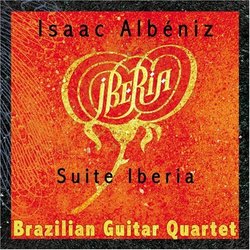Amazing transcription and performance
Daniel J. Rose | Shrewsbury, MA USA | 04/24/2008
(5 out of 5 stars)
"I plan to expand this review later, but I wanted to give it five stars ASAP, because it is such a remarkable recording. This is one of two transcriptions for guitar quartet that I know of the formidable and unforgettable Iberia suite by Isaac Albeniz, which he originally wrote for solo piano, and it is by far the best of the two.
The original piano score is one of the most difficult, and at the same time, one of the most rewarding solo piano compositions ever attempted. It is an impressionistic work with immense contrapuntal, harmonic, and rhythmic challenges all organized to present some of the most infectious and poignant Spanish dance themes ever set to music. The effect is one of hearing these archetypal themes as if set in the midst of a bustling Spanish street market for one, flying across a vast Spanish desert for another, floating in the vast and tranquil Spanish Mediterranean for another, and so on. Each of the twelve pieces of this suite presents its own unique set of technical challenges in keeping its own themes alive amidst the most complex and constantly changing textures. I know of only one piano recording that almost perfectly captures the essence of this work, which is by Aldo Ciccolini (Albéniz: Iberia; Granados: Goyescas).
Ironically, the musical performance of the Brazilian Guitar Quartet on this recording takes prominent inspiration from the recordings of the great Spanish Pianist Alicia de Larrocha. And, indeed, the choice of tempo and rhythmic emphasis in the phrasing of these pieces often comes closer to Alicia de Larrocha's interpretation than to Aldo Ciccolini. However, possibly because of the demands of ensemble that four instruments require, I believe that this Brazilian Guitar Quartet's performance has a clarity and consistency that comes closer to Ciccolini than to the recordings of Alicia de Larrocha that I have heard. Where de Larrocha's rubato, to me, loses the integrity of the thematic and rhythmic line, the guitar quartet (again, like Ciccolini) maintain a more orderly control of tempo that propels the dance elements of this work.
In short, I think these guitarists take de Larrocha's inspiration and improve on it significantly. Part of the success is in the guitarists' original transcription itself, which captures most of the harmonic and contrapuntal texture, as well as the technical agility and melodic line that Ciccolini reveals in his powerful piano performance. One or two passages have been rendered with somewhat less of the original texture than others, but by far most of it is amazingly reminiscent of the original score, and the guitarists are, one and all, remarkable virtuosi in bringing it off so well.
Aside from this occasional overly simple transicription (and very little of that there is), my main quibble is in their drawing more from de Larrocha's rubatic and halting approach rather than from Ciccolini's fluid and lyric, yet rhythmic and dance-like approach, which I believe clarifies and propels what de Larrocha sometimes leaves a bit muddled and disconnected. However, yet, again, the guitar quartet brings it off more convincingly, and with beautiful balance and tonal resonance across the instruments, some of which are fitted with strings at an extended tonal range to capture more closely the full span of the original score.
In fact, after Ciccolini, I listen to this guitar version of Iberia far more often than any other piano version that I have heard, and highly recommend it.
"

